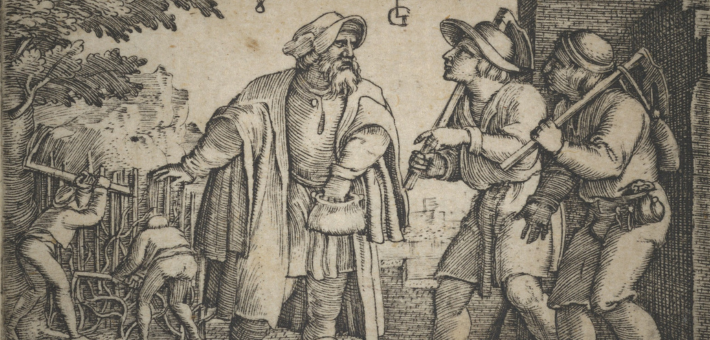Commentary on Philippians 2:1-13
Most preachers consider preaching on Philippians 2 only when it arises annually on Palm Sunday, but to do so misses out on the power of the cross as a moral pattern, a significant New Testament theme that is often not seriously dealt with. To speak of the cross only in Holy Week, when hearers are rightly focused on the drama of Jesus’ crucifixion is to miss out on the stunning choice that Jesus’ early followers made, to claim this tool of Roman injustice as a symbol of and pattern for God’s justice in a heartbreaking world.
Phronesis: the wisdom of knowing what to do
The Greek verb that shapes this whole reading is phroneō, to have a depth of understanding and practical wisdom, to know how to act rightly, especially in confusing or complex circumstances. Paul uses this verb twice in Philippians 2:2, and then it becomes the governing verb for the so-called Christ Hymn of 2:5-11. English does not have a verb like this, so it is often translated as “having a certain mind” toward things. Here, where Paul is stressing the need for unity, it shows up as “be of the same mind,” “be of one mind,” “Let this mind be in you that was in Christ Jesus” (Philippians 2:2, 5). But turning the verb phroneō into the noun “mind” loses the kind of fully embodied wisdom gained over time and experience that is really at stake here.
Following the Christ Hymn, Paul issues the direct counsel to the community to “work out your own salvation.” His clear intent is that the moral pattern given in the narrative of Christ’s descent (and resulting exaltation by God) in 2:5-11 is to govern how the Philippian church works out a saving path together, and the grounds of their hope, in the midst of likely financial stress and social rejection.¹
Directly after the portion of Philippians 2 in the lectionary, Paul gives three examples of people whose moral deliberation follows the pattern of Christ’s self-risking descent as a slave to God’s saving mission: Paul himself (2:17-18), Timothy (2:19-24), and Epaphroditus (2:25-30).
The cross as a counter-cultural moral pattern
The lyrical passage commonly known as the Christ Hymn has two parts: Christ’s choice to descend from his position of power and status “in the form of God,” taking on the “form of a slave,” completely obedient to God’s mission; and his subsequent exaltation by God to the highest place. The first half depends upon Christ’s moral choice; the second half is purely the power of God at work in raising and exalting the faithful Christ. This clarity about the distinction between what human beings can control and what is only the work of God is then mirrored in verses 12 and 13: “work out your own salvation … for it is God who is at work among you.”
Note that these are all plural commands. The Philippians are to discern together a path of faithfulness in the context of the difficult decisions they need to make, in order to deal with debilitating factions in their midst and mistreatment from their wider community. The first four verses suggest some ways that the moral pattern might manifest in the particulars of the Philippians’ life together. The practical wisdom of Christ manifests in love, sharing in the Spirit, in compassion, sympathy, mutual humility, and in shared concern for one another’s best interest.
Viewing the cross as a moral pattern is also prevalent in the Gospels, as in Mark 8:34-37 and its parallels in Matthew and Luke (“If any want to be my followers, let them deny themselves and take up their cross …”). But what makes a particular experience of suffering a cross, and not purely suffering, not a problem to solve? There are several characteristics of the cross that followers of Christ should keep in mind:
- The cross is completely unjust. The charges at Jesus’ trial are false, and it proceeds in a very unorthodox way, because those in power want to force the whole group of Jesus’ disciples to back down. But neither Jesus nor his followers will be silenced.
- The cross is a turning point, where people can either keep serving the mission of God or back off. Jesus’ inward turn in the Garden of Gethsemane from his will to God’s will is a critical point in the crucifixion narrative.
- As a moral choice, the cross must not be imposed on others, and most especially not imposed by people with power upon people without power or full agency, as has happened far too often across history.
- The pattern of the cross—offering oneself for God’s mission—might be chosen on a personal level, as one person gives up status or power or favor to serve the needs of someone else. But it can even more significantly be chosen on a societal level, for the benefit of the wider community, or the world, or the creation. The key issue is the willingness to forego something one is justly entitled to, to serve someone else’s need.
Many moral issues in our present-day lives could be elucidated for Christians with reference to the cross as a moral pattern. Powerful preaching on this passage will be specific in giving examples that help people see the pattern of giving up something to which one is reasonably entitled, in order to serve someone who is more vulnerable, or whose need is greater. For Paul, this is the defining Christian moral pattern, repeatable endlessly in every context, a pattern fueled by the powerful grace of God, multiplying human effort.
Work out your own salvation … for it is God who is at work among you
The final verses of the lection lay out both a process and a promise, as the Philippians discern together how to apply the cross as a pattern for their life together and for life in their city. There is a flaw in many translations, in which the word “me” is inserted (just as you have always obeyed me). There is no “me” in the Greek. Adding it undoes the importance of Christ’s obedience to God becoming the Philippians’ discernment of what obedience to God entails in their situation. Paul is suggesting a process of communal discernment to strengthen both individual and group decision-making, and he assures them that when they engage it with the mind of Christ, God will be in the midst of them.
This emphasis on the active presence of God “among you” assures the community of both God’s nearness and the divine empowerment that may fill their chosen actions with overflowing life. Attunement to God’s presence is what fuels Christian moral discernment, transforming it from an effort to a joy.
Notes:
- For a full discussion of possible causes of the Philippians’ economic stress, see Peter Oakes, “The Economic Situation of the Philippian Christians,” in The People Beside Paul: The Philippian Assembly and History from Below, edited by Joseph. A. Marchal. Early Christianity and its Literature 17 (Atlanta: SBL Press, 2015), 63-82.


October 1, 2023